Milagro Sala has been jailed for six and a half years, half of the maximum prison term which the Supreme Court has just ratified.
In a feature-length interview, the Túpac Amaru social leader hits out at the Jujuy courts and the political persecution of anything against the local government.
Sala, 58 and recently hospitalised, asks for dialogue between all political groupings to combat poverty and for a wider discussion of the redistribution of wealth.
I want to start with a question suggested to me by you yourself, Milagro Sala, and which seems to me to reflect your state of mind, which is for whom would you vote if there were a run-off between [Javier] Milei and [Jujuy Province Governor Gerardo] Morales?
If I had to choose between Milei and Morales, between bad and and worse, I’d prefer Milei because since this is my province, the issue is – without any self-promotion – that unfortunately Jujuy is going through a pretty rough patch, not only economically but with femicides and the disappearance of children when we have so many enterprises in this province which rake in the money like lithium, marijuana – managed by the son of Gerardo Morales – and the Ledesma sugar refineries.
We have three main refineries: La Mendieta, La Esperanza (which is virtually owned by Morales) and El Puesto and in the latter two they are evicting all the families. It arouses attention that they have surrounded the refinery with [private] security forces and while I have no exact information, it is said that they are planting marijuana. Unfortunately, I say, because Jujuy is a province very rich in production – in tobacco, vegetables, the Aceros Zapla steel plant, Cauchari [solar park], Girsu for rubbish disposal and many other enterprises. And if you do your sums, we would surely have a super-rich province but unfortunately we are not a rich province today, we are in debt, owing seven international loans which we pay off, drop by drop, but the profitability of each enterprise, I repeat, is huge. And that hurts us as the people of Jujuy because there is a lot of poverty, school dropouts and child malnutrition and they do not want to verify that. And unfortunately that happens because in our province there is no independence of the Judiciary, which is run by Freddy Morales, the governor’s brother.
For that to happen there have to be accomplices and the prime accomplice of what is happening today in our province, which is a disaster, is the Rivarola rural clan, who are major partners in lithium, marijuana and also the health sector because unfortunately in the dire era of Covid-19 (with things staying the same until now) they had a private clinic, the Clínica Fátima, in Palpalá in direct partnership with Freddy Morales and when this awful pandemic began, many of them made big business deals – for them but as for the people of Jujuy, those who did not die from Covid-19 died from dengue because unfortunately the hospitals were very full and unequipped while the doctors and nurses denouncing this were indicted.
Of course afterwards we might comment on the accusations made by every sector but today nobody can raise their voice to say anything because they will be indicted by Morales via prosecutor [Sergio] Lello Sánchez. Unfortunately we have a police free to act according to the whims of Morales. We had already denounced the[provincial] security minister last year because we saw him tapping telephones – I thought at first that I was the problem but afterwards when I began watching television, I saw in the national media that they were tapping telephones, shadowing people in cars with licence plates and lodging cases against political sectors, trade unions and social movements, I started thinking that this was something decided by the government of [Mauricio] Macri. But now I see the same things happening in Jujuy with Macri no longer in government.
I have bodyguards at the door of my house who are not my own but the provincial police. At some point a judge said that they had to take away those plain-clothed police but yet I still have them today and they take photos of everybody who comes to visit me with their mobile telephones, making them go viral in all the media.
Those plain-clothed police at the door of your house whom you have denounced not only take photos but sometimes ask visitors to show their [identity] documents. Were they also there on the day you were visited by the ministers [Eduardo] ‘Wado’ de Pedro [Interior] and Elizabeth Gómez Alcorta [Women, Gender & Diversity]?
Yes, they were there and what is more the minister Wado de Pedro approached them and asked them what their function was, to which they replied that they responded directly to the Security Ministry. It is striking that the police should say that when you have to have a court warrant for that. Not even genocides have as many policemen as I do at the door of my house.
One legislator, Pablo Baca, voted in favour of expanding the [provincial] Supreme Court and later became a justice. In an audio he recognised that your arrest was for political convenience due to your capacity to mobilise people. Today, six years later, if you were free, would you have the same capacity to mobilise people as you had 10 years ago, for example?
I feel that I would because many of our comrades continue to work on the ground despite many of them being indicted in the 17 cases which Morales set up against me together with Lello Sánchez. They work with nothing, making buns, empanadas and pizzas to accompany a glass of milk. The comrades have reorganised and mobilised five or six times and the first time they mobilised in cafés, bars and restaurants, the people came out to see Túpac Amaru.
I’m not interested in the infighting of any political sector. What particularly interests us is that the comrades have something to eat, that soup kitchens cease to exist and that parents have jobs to bring bread home while the children can return to school with their parents buying them the sneakers they want instead of waiting for a bag of groceries or Plan Trabajar job creation.
If you ask me whether I am in agreement with the [state-donated] grocery bags or Plan Trabajar, I am not. I ask in particular for redistribution and jobs, speaking not only with the government but with every sector, setting aside the [party] banners of different colours, dedicating ourselves to working to combat poverty and redistribute wealth. Because during the pandemic I often cried because many of our comrades said that members of their families had died and that some of them did not have anything to eat because they could not go out and do odd jobs during lockdown. The pandemic did not do any good but a lot of harm to all Argentines.
If you go to a low-income neighbourhood and want to talk politics with the comrades, they will tell you that they are not interested in Peronism, Cambiemos or whatever political sector, they just want to eat, live, have jobs, healthcare and education, sending their children to school – they want to see how we survive and live well, as brother Evo Morales says. If you ask me whether all this has made me lower my head and gaze, it has not – every blow they have given me, everything done against me in particular has only made me much stronger. Because at the start when I first went to jail, I cried a lot and asked myself what I had done to be in prison but then I came to understand that I did not know whether I was a political prisoner or arbitrarily detained – call it what you will – but that it was politics which sent me to prison and that if we had not done anything, I would be free. Perhaps if I had negotiated with somebody, I would be free today.
Your case awaits resolution by the Supreme Court. You asked for the Jujuy provincial courts to be placed under trusteeship and the Supreme Court has rectified a conviction for threatening a police station while it must still resolve another case [the so-called ‘slum kids’], which you have challenged. What expectations do you have of this Supreme Court acquitting you or ending up confirming your convictions which add up to 13 years which, even assuming a reduction to two-thirds of those 13 years, still leaves you with some years in prison?
I have no expectations, I have 17 cases invented against me and a further five cases in which I will again face trial this year. One of the judges trying these cases, Pablo Pullen Llermanos, went berserk one day and sent me to Güemes prison, also giving me house arrest at my place in Del Carmen which we had to fix because they had robbed everything, even the doors and windows, and where security was provided not by the provincial police but by the Border Guard when it was not a federal case but a provincial one.
I say that I have no expectations because unfortunately one sees that the courts do not work to do justice but according to political colours. I do not want them either to convict or acquit me, I have asked that all the files be checked because unfortunately, as you have just said, they gave me two years for a threat when all they got me for was making a telephone call in which at no moment did I talk about placing a bomb against anybody. I was denounced by a police station. We sent tons of evidence but none of it was admitted. I asked them to let me show a video where we were going to demonstrate, with documents, how we built each house and why we were saying that their construction cost a lot of money but they did not let us. We had around 120 witnesses, of whom nine were allowed to take the stand. All nine were threatened in their homes and told not to agree with anything Túpac Amaru was saying.
You’ve been in jail for six years, can you imagine another six?
With these courts and with Morales as governor, I have no expectations of anything. If the courts changed, if the courts could work otherwise, I might see a ray of hope. But right now, I have no hope, none at all. Because, I repeat, the courts act according to political colours, unfortunately. From what we are seeing from the courts, when they should be indicting Macri, who has almost 120 cases against him, he nevertheless remains free, having robbed all the money of the International Monetary Fund for which he has been denounced – he remains free, and what it is more, he dedicates himself to giving lectures on how Argentina should be run.
Do you feel that unlike Macri you stand accused because you are a woman, dark-skinned, indígenous and a social and political leader?
Look, if I were a green-eyed male with the contacts which Macri has, I would not be in prison, I would be free but unfortunately I am in prison because I never bowed to the powers that be. What’s more, at times we had problems with friendly governments because we did not care if they were friendly or not – when we needed something, we went out and fought for it in the street, we had to fight and show that we were right.
We in Túpac Amaru always said: “We do not bring together a bunch of jobless people but form awareness.” And that awareness makes many of our comrades with this skin colour argue with the big construction companies, managers, ministers and economists as to why so much money goes into construction.
I remember once when we were dreaming of a secondary school, we said to ourselves let’s go for it because so much money is allocated to construction and that is something real. In front of our headquarters, with the construction money left over, we bought three houses, built a secondary school and a university college. We said to ourselves that we had built all that with effort and the money left over from construction. We likewise constructed sports centres in every community and housing estates in 11 localities so that in total we have built over 8,000 housing units and around 27 sports centres throughout the province. In underprivileged neighbourhoods and shantytowns the comrades were asking for a swimming-pool to be constructed and next to it we installed a health centre, canteen, basketball court and football pitch. And we did all this out of the goodness of our hearts because our dream was that if a rich man had a swimming-pool where he could sunbathe, the poorest should also have a swimming-pool where they could sunbathe. And the canteens were so that there could be a local library and small textile workshops and other enterprises so that the comrades can develop the communities where they live.
When I interviewed you up there in Jujuy over 10 years ago, you showed me your works, including what you jokingly called your ‘country’ [upmarket gated community] with a gigantic swimming-pool. How are those installations which you built today?
Unfortunately in the water park, as we called it, which was the biggest park in northwestern Argentina, the swimming-pool and the games for children have all been destroyed and any time a comrade wants to clean it up or do something there, the police unfortunately show up and chase him off. Drugs have expanded enormously, not just in Túpac Amaru neighbourhoods but everywhere. In some factories, for example, our metal factory, which was a dream, they stole all the machinery and today it is a laundry set up by neighbours occupying it. In the textile factory the machinery is piled up and inactive. What hurts the most, in [the] Cemir [rehabilitation] centre, there are only jobs but nobody working with the heated pool continuously rented out to private individuals when it was for handicapped children. It hurts so much because when we built Cemir and its surrounding works, we said that the state should be attending to handicapped children free of charge. Nevertheless, that has not happened in Jujuy.
You recently said that when you were in prison, you wondered what you had done to be inside. On seeing your work destroyed, do you ask yourself: “What did I do wrong for everything I built to be in this condition today while I end up in jail?” Not what others did wrong but you yourself, some self-criticism.
At times I was very naïve when they told me that they would be going all out against us. I remember in Cristina’s last speech, she told us that we would have to organise because they would not be coming for us individually, they would be coming for all of us and I did not believe that. I remember that when I was supposed to take my oath as a Parlasur deputy in Uruguay, it was commented that they were going to repress the comrades already camped out in Plaza Belgrano. I stayed behind to resist with my comrades from other social organisations, only for those social organisations to start working with Morales overnight. I said to myself: “I believe in other people but now I do not know if others share that belief.” But I was very naive. Many comrades wanted jobs and housing and we always said that we were backward because in every locality there was no health centre, no swimming-pool, no sports centre, nothing of the sort so we said: ”We have to build works as fast as possible to begin covering the needs of all comrades and people in Jujuy,” but we did not prepare ourselves politically.
It was naïve to believe in other people, that nobody was going to betray us because they did. It was naïve because unfortunately some people seem to change according to the situation. I remember once, when I had already been in prison for six months, they took me to the courtroom where a judge and prosecutor asked me to sign something against Cristina. When I read it, they were accusing me of passing on money-bags to her and [her son] Máximo. I always said that this was a lie, that nobody had ever asked me for money and that we would directly denounce anybody who did. That turned out to be an official of the Municipality of Jujuy [provincial capital], we denounced him and afterwards nobody dared to ask for a peso from us. And when I said that to the judges and prosecutors, they took me before a judge and I said to him: “You are where you are because many of us trust you and unfortunately you are now accusing me,” to which he replied: “Times change.”
In an Instagram chat with Juan Grabois, you criticised the Alberto Fernández administration for doing business with lithium and marijuana while postponing the question of the situation of political prisoners. Are you upset with the Alberto Fernández government?
More or less because, for example, one of his ministers came up to do business with lithium and unfortunately he preferred making business deals with them to working as a minister for everybody. Because I repeat that wealth must be redistributed urgently, sitting down to discuss that with all sectors, and unfortunately that is not being done. They are granting subsidies to those who have the most while for a plan they ask you [to fill out] 10,000 forms. During the pandemic they gave out to Pérez Companc, Techint, the Macris, Bunge & Born and Blaquier and when those with the least asked for the IFE emergency family benefit, they demanded 10,000 forms. For example, a comrade said that he had a car which he had to sell 15 years ago and he was told that he has this car when he does not have it so that he would not be given an IFE benefit.
They do not justify the big subsidies given to big business. If they want to give subsidies to big companies, then they may go ahead but if they give subsidies to those who have the most, they should also give as much to those who have the least. But unfortunately we are undergoing an economic situation in which nobody can make ends meet, everything goes up. Those collecting 19,000 pesos do not even have enough to pay their taxes, that does not cover anything.
You went to jail in 2016, a very short time after Gerardo Morales and Mauricio Macri took office as governor and president respectively. Did you have any illusions that with the change of government, the arrival of Alberto Fernández, your penal situation might change?
Yes, I had so many illusions because I thought he was going to change the Judiciary, to do the same as, for example [Luis] Arce in Bolivia, who changed the Supreme Court and released the political prisoners as soon as he took office. Unfortunately that did not happen here and we are kept waiting to see how they continue treating us as political prisoners.
The president has great faith in the courts, the judges and the prosecutors, believing that they should be independent. And it would be better if they were but they are not – it would be good but unfortunately we do not have that, neither in Jujuy nor in Buenos Aires. They act according to political colours.
Do you feel accompanied by Cristina Fernández de Kirchner?
I do not want to have much dialogue with Cristina because it is not that I’m afraid of Clarín and La Nación but unfortunately they will for sure start accusing her of talking to a criminal drug-trafficker with a ton of cases against her. I have already experienced that and the truth is that I do not want to go through that any more.
Due to the five cases I face – excuse me for going back to a previous question – around 39 comrades will be going to jail because all of these cases are always carrying a conviction and the only error those 39 comrades committed was to work in Túpac Amaru or to befriend or defend Milagro Sala at some point and I do not want that to happen. Because Túpac Amaru was not born with Kirchnerism but in the 1990s when I was secretary of the organisation.
Excuse me for putting it like that but we were born out of the clumsiness of the political sectors. When everybody was saying on December 19 and 20, 2001 “Que se vayan todos [begone with them all],” I was the union secretary of the ATE [state workers union] and we held a congress with the comrades on the future awaiting us all and what we were going to do with the comrades left out in the street who were not ATE union members and who did not have a bit of bread to eat. It arose out of those congress discussions that we had to work with the social organisations. That was also the start of the Triple C [Corriente Clasista y Combativa] and a whole bunch of social organisations, with whom we took care of the jobless. Neo-liberalism had advanced greatly, causing disasters in the country. Let us not forget that both [Carlos] Menem and [Fernando] De la Rúa privatised many companies belonging to the state, leaving many people in the street. With nobody taking charge of that, we did, because I in particular could have carried on quite comfortably as ATE union secretary. Yet we went out into the streets with the comrades and during that period we turfed out five corrupt governors in the province.
You say that you do not want to talk to Cristina in order not to do her harm. Does the same go for Alberto Fernández, would you say that by talking with him you would do him harm?
Look, when he talks to me – because I’m not going to deny that sometimes I talk to him – we don’t talk about the cases or anything like that. When he finds out that my husband or my son is ill, he calls me up and asks me if I need anything and how my family is doing.
What would be the first thing you would do if, for example, in the next few weeks they were to free you because the Supreme Court so decides?
Excuse me but they’re not going to free me.
Allow me to suppose they will, all the same.
No, because of the number of cases I face and Morales not wanting to free me. His aim is to keep using me as a smokescreen. Every election he faces is a new case against Milagro or bringing some case to trial. And now he wants to be president so he’s going to continue using me as a banner.
Even if only in the form of a dream, if you had the possibility to be free, what would be the first thing you would do?
I’d cling to my family and my grandchild, I’d go to the river and touch the water, the pebbles and the trees. That carries plenty of feelings for me because I miss nature a lot. Beforehand, when I felt bad, I’d go down to the river, bathe, touch the pebbles and hug a tree, which my father taught me to do when I felt down and sad. I’d do that, taking my son and being with him, also my husband and the militants.
Let’s see if I’m interpreting you right, when under house arrest you can surely embrace your husband, your grandchild and your children. What you cannot do is hug nature, do you equate nature with your family?
But it’s not the same thing hugging children and being able to help them when in detention. My son lives six blocks away from my house and that’s why he’s sickly because I cannot go to his house and be at his side. An ambulance has gone so often to the aid of my son or my husband when they feel ill. Last time, he was in hospital for a week and I could not be by his side or the courts would give me one or two hours at most. When my daughter goes to sit exams, I cannot accompany her or when my grandson has problems in school or when I have to accompany them to meetings and events and cannot be with them. As you can see, I’m very family-minded and have always accompanied every activity of my children and grandson. Now I cannot and that hurts me deep in my soul because I feel tied down, when I cannot be with them, I feel myself choking for air, I want to scream and cry, to break with my illusions because I know that I have been mistaken in some things but what is happening to me is so terrible that I don’t think I deserve it. I know that in life you have to bear the consequences but I have never seen a person so evil that one would also lash out against all their family too and want to take everything from them, even the hope to live. I think like a Colla [or Qulla, referring to indigenous peoples of Bolivia, Chile and Argentina living in Jujuy and Salta] so if you ask me whether I hate Morales and if I am annoyed with him, in my Colla heart, I have already forgiven him. I know that if he carries on like that, he’s only hurting himself internally.
I’m calm without spite or hatred, not because he is right but because he has taught us not to hate. When you are not burdened with that hatred, you can be sure that you can continue living. Despite everything they have done to me, I do not take sleeping-pills, I sleep in peace. At some point I’d like to be face to face with Gerardo and tell him what I’m telling you, that politics is nice but you have to know how to cope with it, not with hatred and spite and vengeance because politics is life. And we have to learn how to cope with it, healthy in mind and spirit, which is what always happened to me. I have always followed the sayings of our brethren of the indigenous peoples, that life is nice but you have to learn how to cope with life and know that if you feel bad, nature will restore calm to you. That’s why I fight against contamination, against cutting down trees because they have life. Some would say that pebbles have no life but they do, the earth has life, the trees have life. Just as you might take care of a little animal, we must look after nature. For me that means a lot of positive energy and many people do not understand that. Some would say that it is madness but it is the nicest thing.
I’d like you to close this interview with some reflection, directed towards whomever you think appropriate – the judges, the Supreme Court, Morales, your people.
Simply that it is not a dream, I like it to be a reality that all political sectors – Frente de Todos, Cambiemos, the left, everybody – get together because we have to talk about how we can combat poverty and how those who have the least can dream of living a bit better. And that depends on all the political sectors. We all - the politicians, the social organisations and the trade unions - have the obligation to accompany them. And for that we need to discuss the redistribution of wealth because it is the only way we can cover all the needs of those who have the least so that in the future we can construct a country for everybody, not just for a few. Because today the country needs us, the country is in bad shape. I don’t want to blame anybody, on the contrary, let’s all get together to work towards redistributing the wealth which belongs to all Argentines. It’s simply a case of “Patria, patria y patria” so that for once and for all we stop contaminating the places which belong to the indigenous peoples. Stop stripping us of our territory because despite what very few people might tell you, we have less territory with the big mining companies, lithium with all its contamination, lumber companies cutting down trees are advancing every day, it’s impressive. I simply ask that we stop all that.
Producción: Sol Bacigalupo and Natalia Gelfman.







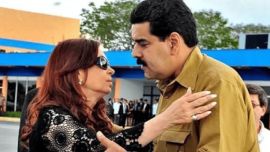







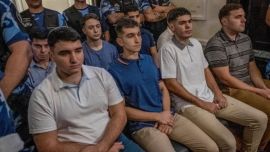
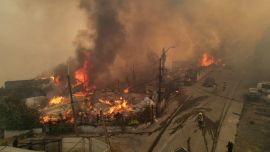
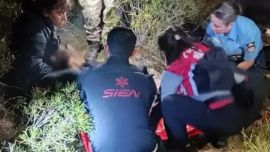
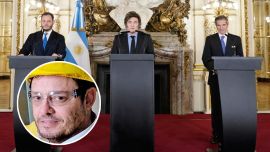
Comments